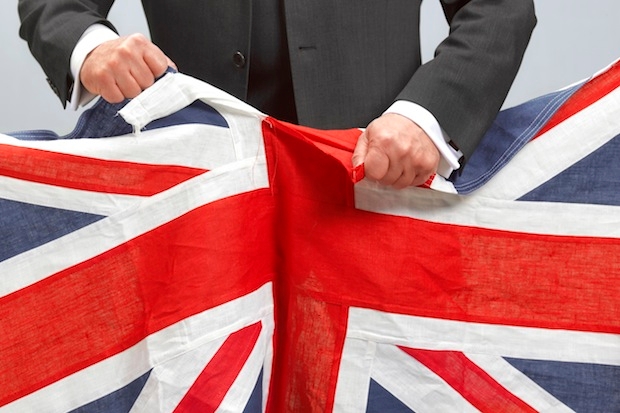[audioplayer src=”http://traffic.libsyn.com/spectator/TheViewFrom22_24_April_2014_v4.mp3″ title=”James Forsyth and Alex Massie explain why we need more optimism in Scotland and Westminster” startat=1538]
Listen
[/audioplayer]For centuries, the possibility of Scottish independence seemed so remote as to be laughable. Until recently the nationalists seemed quixotic, rather than menacing. Now, however, we are facing the very real prospect of a ‘yes’ vote in the Scottish referendum in September, which would in all probability result in the resignation of David Cameron as Prime Minister. An ICM survey published at the weekend found that 48 per cent of voters who have made up their minds intend to vote for separation. The stakes are terribly high.
There is much debate about the real state of public opinion, and much faith placed in the old rule that, as a referendum draws near, undecided voters tend to favour the status quo. But partition of the United Kingdom and the end of 300 years of shared history is a real threat. George Osborne’s main gambit, saying that a separate Scotland would not be allowed to use the pound, has, if anything, strengthened the ‘yes’ vote.
For decades, it was possible to puncture the myths created by the Scottish National Party by simply pointing out the trouble that partition would cause. Most economists agree that an independent Scotland would not be a land of milk, honey and oil, but would be the world capital of austerity, since any government would have to close the gap between its promises and its capacity to pay for them. The Scottish National Party has always protested against ‘negativity’ and ‘bullying’ from its enemies, because it dislikes anyone listing the many ways in which separation would hurt ordinary Scots.
But it now seems that the unionists have overplayed their hand. Take Osborne’s currency threat. There are some 300 million banknotes circulating in Scotland — are voters seriously to believe that redcoats will be sent up north to confiscate them all? The European Union president says that its rules may force Scotland to re-apply for membership, and it is also forbidden to bail out countries. But, as everyone knows, the EU changes its rules to accommodate whatever is expedient.
In Scotland, the debate is taking forms that Westminster politicians do not understand. Those who truly believe that Scotland should be a separate country tend to be evangelical about it. Their strength is in old-style campaigning: meetings held in towns and village halls. The Better Together campaign does not have this zeal — and this is, in a way, understandable. It is harder to evangelise for the preservation of the status quo.
This needs to change. Exposing weaknesses in the nationalist argument is not enough — the unionists need to make the wider, more emotional case for saving Britain. It is hardly surprising that a campaign promising ‘Yes we can’ is proving more persuasive than one suggesting ‘No you can’t’. Procedural difficulties — currency, EU membership, the ability to sell Scottish peas as British peas — are real. But they stir neither hearts nor minds. These are the technical difficulties politicians and bureaucrats are supposed to solve. They are not the things of which history is made.
By contrast, the SNP offers voters the promise of a glorious date with destiny. Scotland will be a nation once again, they say, and besides, in this largely peaceful, globalised world, there’s no need for us to remain yoked together. The Union may still offer Scotland security and opportunity, but the nationalists claim that neither trade nor peace will be seriously threatened by independence. The Union, by this estimate, has outlived its usefulness.
Even now many Britons seem unaware of the peril in which their country finds itself. Without North Britain there is no United Kingdom as we have known it for more than three centuries. There is only England plus the principality of Wales and two thirds of the province of Ulster. If the Scots vote ‘yes’ then all of us will be diminished, having sundered the ties that have bound us for years. Yes, Scotland can be independent; it can survive. Will there be a lesser Scotland after independence? Probably. A crippled Britain? Certainly.
Apart, neither England nor Scotland were particularly remarkable countries. Together, we have been extraordinary. But reminding — or persuading — Scots that they benefit from the Union is a task that seems beyond the current pool of unionist politicians, who are too used to fighting each other. To the question ‘What do we want?’, the answer ‘The insurance of a larger pension pool’ will not suffice. It is telling — and dispiriting — that the most publicised unionist intervention in the debate thus far came from David Bowie, not Alistair Darling, David Cameron or Gordon Brown.
It may not yet be time to panic. The ‘no’ campaign still retains a lead in the polls and, even now, its victory looks (just) more likely. But it is now clear that, unlike most elections, the Scottish referendum result really will be decided in the campaign. The Better Together campaign’s lead is so slight that one major PR disaster could result in outright defeat. All last year, when the polls comforted unionists, Better Together insisted there remained ‘no room for complacency’. There certainly isn’t now.






Comments